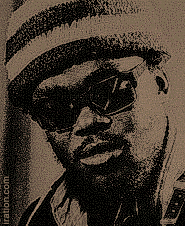 name: Aston Francis Barrett (aka Familyman or Fams) name: Aston Francis Barrett (aka Familyman or Fams)
born: November 22, 1946 in Central Kingston, Jamaica
position in Wailers: bassist, guitar, background vocals, songwriter, producer, percussion, backbone of Wailers
The Wailers News crucial picks (some of the songs Familyman shines on): The Wailers' "Black Progress"; Bob Marley & The Wailers' "War"; The Upsetters' "Return Of Django"; Harry J. Allstars' "Liquidator"; Familyman's own "Well Pleased" and "Cobra Style"; and needless to say nearly any other bassline Familyman has laid down is crucial!
life: Music was very big in the Barrett family, with both Familyman's father and grandfather being accomplished musicians. Familyman is a self-taught musician, having created his very own bass, a one-stringer at an early age, where he would play with his brother Carlton, who would play drums on empty paint cans. It wasn't until some time later that Familyman received his first real bass, which came from a member of the vocal trio group The Gaylads. Familyman's first band was called the Hippy Boys and consisted of Max Romeo on vocals, Alva "Reggie" Lewis on guitar, Glen "Capo" Adams on keyboard, Carlton "Carlie" Barrett on drums and Familyman on bass. The musicians in this band later went on to form The Upsetters, Lee Perry's unbeatable backing band, recording some of the most well-known Lee Perry & The Upsetter tracks, including "Clint Eastwood," "Return Of Django," "Eastwood Rides Again," among many others. The first song that the Hippy Boys recorded for Lee Perry was "Medical Operation," and usually whenever the group had recording sessions, they used the name the Hippy Boys, but when they performed live they went under the Reggae Boys.
Familyman's very first recording session took place as a member of the Hippy Boys in 1968 on "Watch This Sound" by the Uniques, which featured on vocals Jimmy Riley, Slim Smith and Lloyd Charmers. Familyman also played on the first international reggae hits like "Liquidator" by the Harry J. Allstars. Familyman's status as a musician increased when he and the rest of the Hippy Boys recorded their first songs with The Wailers, including the songs "Black Progress" and "Hold On To That Feeling." The Hippy Boys/Reggae Boys/Upsetters officially joined forces with The Wailers in 1969, becoming a full band unit, and Familyman has remained a member of The Wailers ever since. In 1970, Familyman and Carlton Barrett joined the Youth Professionals, a side project with Tyrone Downie, who would later become a keyboardist for Bob Marley & The Wailers.
The quality and output of Wailers songs featuring Familyman are easily some of the best reggae ever recorded, and it was Familyman's bass that was the backbone for The Wailers sound. With Bob Marley & The Wailers, Familyman recorded on every Island Records' album, touring the world dozens of times over, performing other duties besides bass, including acting as the band's musical director and helping to mix and produce several of these classic albums. After some time off following Bob Marley's death in 1981, Familyman helped to put The Wailers Band back together, releasing several albums including "I.D.," "Majestic Warriors," and "Jah Message," as well as still continuing to tour the world over as the band's backbone, all the while furthering the message of Bob Marley & The Wailers. Unfortunately, as with most of the members of The Wailers over the years, they have not received just royalties for their works in helping to create the sound behind The Wailers.
What is often forgotten about Familyman is the fact that he has lent his talents to countless other reggae and non-reggae artists over the years, including John Denver, Burning Spear, the Tennors, Glen Brown, Johnny Clarke, Alpha Blondy, Joe Higgs, Big Youth, Yabby You, Junior Byles, Jacob Miller, Justin Hinds, Israel Vibration, and the list goes on and on. He has also worked with nearly every Jamaican producer, including Lee "Scratch" Perry, Duke Reid, Bunny Lee, Joe Gibbs, Clive Chin, Coxson Dodd, and many others. Familyman is also a musical teacher, taking younger artists under his wing, and mentoring them in music. Among Familyman's past students include singer Senya, Brinsley Ford who later went on to lead Aswad, Bob Marley's own son Julian, and also bassist Robbie Shakespeare. In fact, in many early sessions that Robbie Shakespeare played on, Familyman not only tutored him, but chose to play guitar so that Robbie could play bass. Familyman is also an accomplished producer as well as recording his own songs, many of which have been released on his Fam's record label. In 1999, Heartbeat Records released an album and its dub companion, entirely consisting of Familyman produced material, including several of his own compositions, recorded over the years since the 1970s. "Cobra Style" and "Familyman In Dub" show that Familyman is in top form in whatever he does. Among the many other instruments that Familyman is well versed in, are the mini moog, piano, and as heard on the "Cobra Style" albums, Familyman also constructed one of the earliest, if not the earliest, drum machine, which he called The Rhythm King. Certainly "The Rhythm King" is easily a title that Familyman has held for over 30 years.
other resources: Visit www.bobmarley.com, which has interviews and biographical information on Familyman. He also gave a nearly no-holds-barred interview about his career and life in the Black & White zine, which should read by all fans of The Wailers.
|